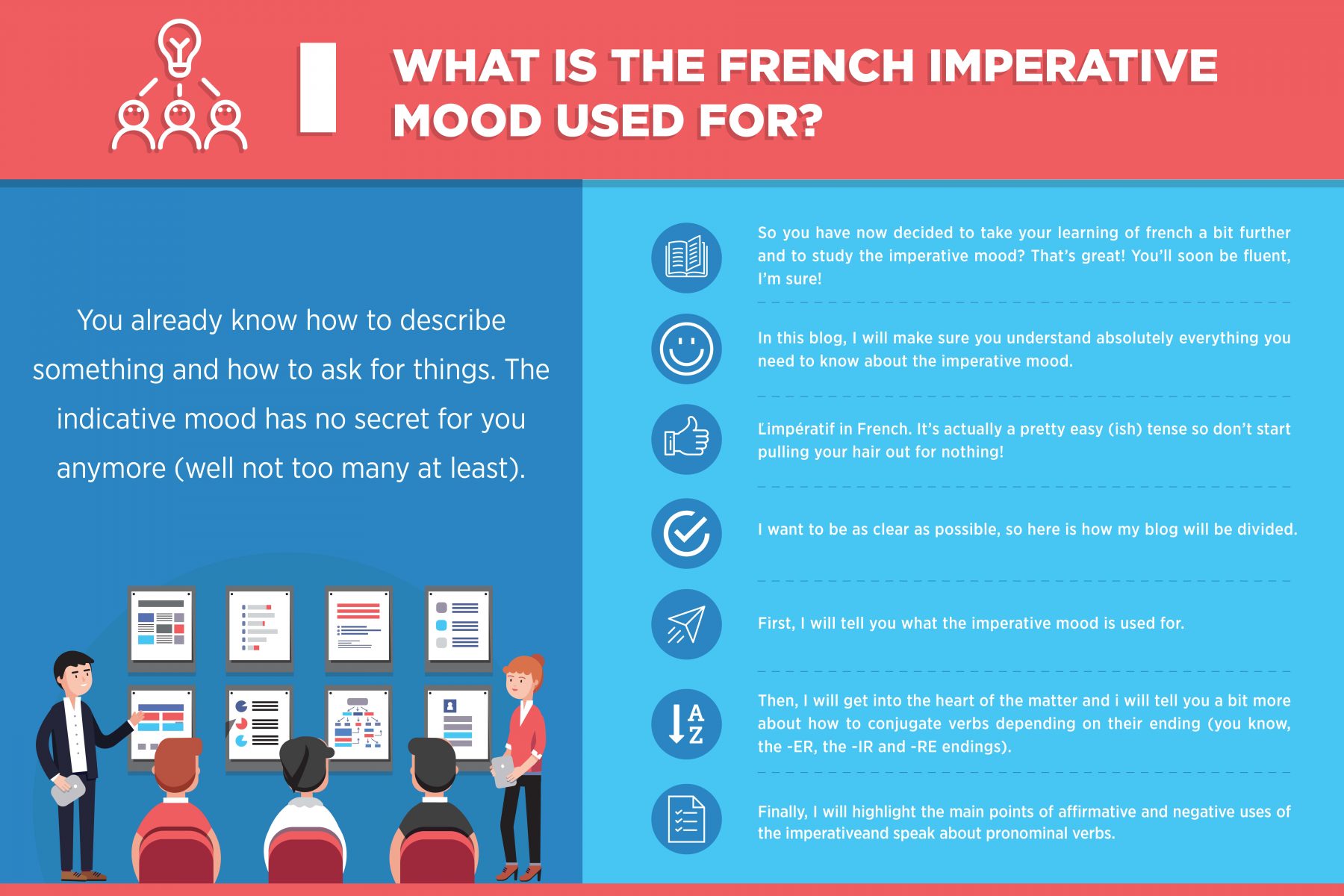
You already know how to describe something and how to ask for things. The indicative mood has no secret for you anymore (well not too many at least 😉 ).
So, you have now decided to take your learning of French a bit further and to study the imperative mood? That’s great! You’ll soon be fluent, I’m sure!
In this blog, I will make sure you understand absolutely everything you need to know about the imperative mood.
L’impératif in French. It’s actually a pretty easy(ish) tense so don’t start pulling your hair out for nothing!
I want to be as clear as possible, so here is how my blog will be divided.
First, I will tell you what the imperative mood is used for.
Then, I will get into the heart of the matter and I will tell you a bit more about how to conjugate verbs depending on their ending (you know, the -ER, the -IR and -RE endings).
Finally, I will highlight the main points of affirmative and negative uses of the imperative and speak about pronominal verbs.
And because, at French Lessons Australia, we always want the best for our students and for our readers, you will find some exercises and their correction at the end of this blog!
Does this sound good to you? Perfect! Let’s start!
1) What is the imperative mood used for?
First, let’s use the correct vocabulary. The imperative is not a tense. It is a mood. The imperative mood contains two tenses: present and past (le présent de l’impératif and le passé de l’impératif).
Note though that le passé de l’impératif is very obsolete and not used anymore. Hurray! We’re down to one tense to learn!
So, what is that mood and what do we use it for?
The imperative is usually used to give an order or an advice in a personal way as you speak directly to the person/persons.
Here are some examples:
Mange des légumes verts. Tu te sentiras mieux. → Eat some green vegs. You will feel better.
Révisons bien pour notre contrôle. → Let’s revise well for our test.
Finissez vos assiettes! → Finish your plates!
As you will more than likely have already noticed, the sentences above are all affirmative.
However, of course, the imperative mood can be used in the negative form too. That is the case when you want to forbid someone to do something.
You know that moment when you look at your child with big rounded eyes but that he/she is still about to do that one thing he/she is not allowed to do so you have to issue commands and use the imperative mood: n’écris pas sur le mur! (don’t write on the wall!). Surely this doesn’t just happen to me… Does it?
Well, just like you would do in the indicative mood, you have to put the ne in front of the conjugated verb and the chosen adverb (pas, jamais, plus…) after the verb.
Ne réponds jamais insolemment! → Never answer back insolently!
Ne mangez pas tout le chocolat! → Do not eat all the chocolate!
Ne nous énervons pas! → Let’s not get angry!
Now, let’s see if you’re paying attention. What do you notice in all the examples I have chosen? Tick-tock, tick-tock, time is up! So?…
Yes, you’ve got it in one! There are only three grammatical persons used in the imperative mood (tu, nous and vous) but the subject pronoun is not used.
OK, and what’s more? I give you a clue: use your knowledge of the indicative mood.
So?…
Yep, you’re right again! You’re pretty good at French, aren’t you?! Most of the conjugations are the same as the indicative present (le présent de l’indicatif). Didn’t I tell you it would be easy to learn? Easy peasy!
Now, let’s get onto the second part of the blog: the conjugations of the verbs depending on their endings.
2) Imperative mood conjugations
a) -ER verbs (les verbes du premier groupe)
Before I develop this part, let me warn you: I will test you a bit further down so pay attention, my friend!
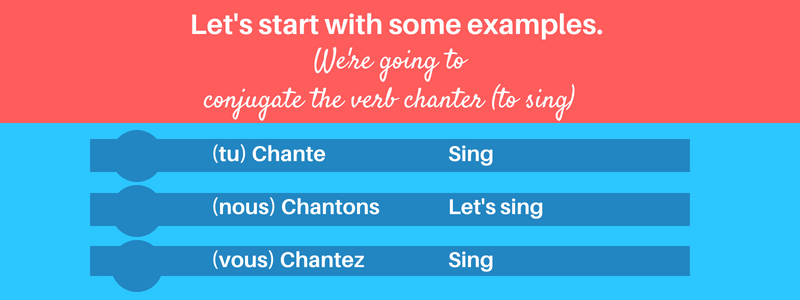
If we do a quick recap: we said the present of the imperative mood is similar to the present of the indicative except that we don’t use the subject pronouns.
Now comes the time when I am going to test your knowledge (I did warn you, remember?).
So, what do you have to add at the end of a verb conjugated in the indicative present at the second person of the singular (tu)?
Exactly. An s.
What difference do you notice in the present of the imperative?
Again, you’re right! There is no s. This is a particularity of the -ER verbs conjugated in the imperative mood.
It is also the case with other ending verbs that are conjugated like -ER verbs (ending in -es with tu).
For example, the verb couvrir (to cover).
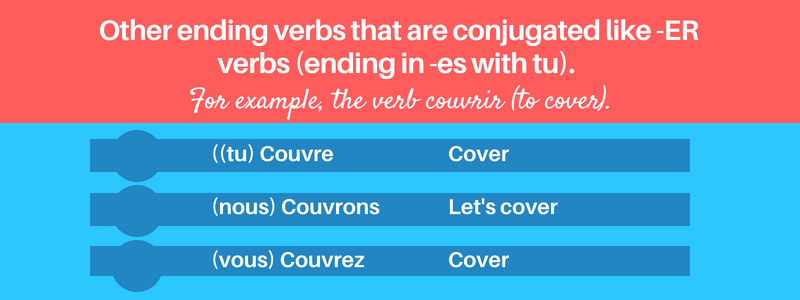
b) -IR and -RE verbs (les verbes du deuxième et troisième groupes)
Once again, you will have to make use of your knowledge of the indicative mood. Indeed, verbs which are irregular in this mood are, for most of them, irregular in the imperative mood too.
The main difference with -ER verbs is that -IR and -RE verbs take an -s at the second person of the singular (tu).
Here are some examples.
Franchir To jump over, to overcome
(tu) Franchis Jump over / overcome
(nous) Franchissons Let’s jump over / let’s overcome
(vous) Franchissez Jump over / overcome
Atteindre To reach
(tu) Atteins Reach
(nous) Atteignons Let’s reach
(vous) Atteignez Reach
Faire To do, to make
(tu) Fais Do / make
(nous) Faisons Let’s do / let’s make
(vous) Faites Do / make
c) Exceptions
Do you know the very famous French saying “c’est l’exception qui confirme la règle” (it is the exception that confirms the rule)?
In other words, yes, like in most French grammar rules, there are some exceptions. Four to be precise.
Considering how easy, compared to some other French conjugations, the present of the imperative is, I supposed we can let the French of this time and simply learn these four exceptions.
They don’t follow the pattern of the present of the indicative at all.
Here they are in alphabetical order.
3) Affirmative and negative uses of the imperative mood
a) Negative form
Like I mentioned previously, the negative form doesn’t differ in the imperative mood. Just like you would in the indicative mood, you will have to put the negative structure around the conjugated verb. Thus, you will first write ne then your chosen imperative verb followed by any negative adverb (pas, jamais, plus…).
Have a look at the following table to understand exactly what I mean.
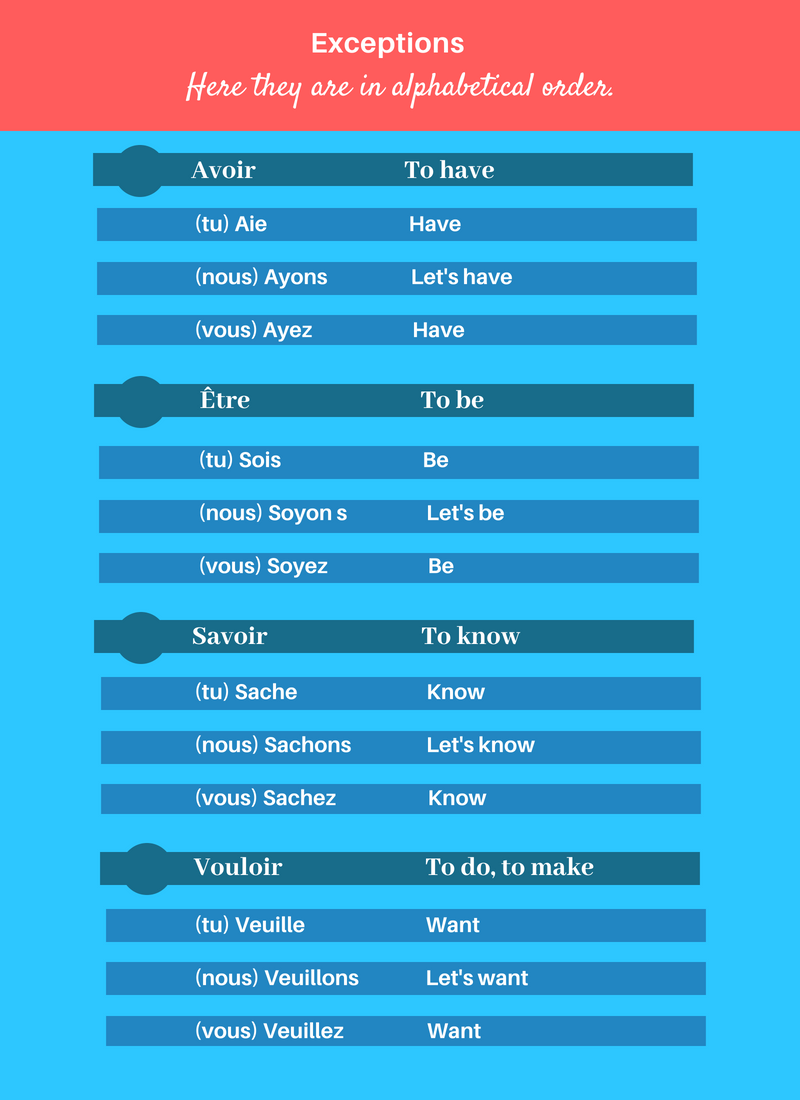
See, it’s rather easy, isn’t it?
Things get a bit trickier when it comes to affirmative commands. Let me tell you why.
b) Affirmative form
Like I have just said, affirmative commands are a bit more difficult. We could say that they are a bit more challenging. It doesn’t sound as bad!
Why? For various reasons. Four to be exact. Two are to do with word order and two with pronouns.
The pronoun comes after the verb and is linked to it with a hyphen.
Excusez-nous (excuse us)
Bois-le (drink it)
Please, note that, in the case of object pronouns, they are after the verb in the affirmative form but before the verb in the negative form.
For example:
Parle-moi → Speak to me
Ne me parle pas → Don’t speak to me
Sometimes you will find both direct and indirect object pronouns.
When that is the case, remember that the direct object pronoun always comes before the indirect object pronoun.
For example:
Donnez-le moi! → Give it to me!
Parle-lui-en! → Speak to him about it!
You’ll find that some French people might try to correct you if you get that order wrong. For instance, if you say donne moi le instead of donne-le-moi, they could ask you: donne toi quoi ? (give you what?).
* In the imperative mood and when using the affirmative form, the pronouns me and te change to moi and toi. These are stressed pronouns.
For example,
Réveille-toi! → Wake up!
Taisons-nous → Let’s be quiet!
Please note that if the pronoun is followed by y or en you will have to contract it. It is to do a liaison and therefore ease the pronunciation.
For example,
Va-t-en! → Go away! / Leave!
Have you forgotten what the French stressed pronouns are? Not a problem. Here’s a little reminder.
* I spoke about liaison and easier pronunciation just above. Well, this last point is also linked to this. Indeed, if you are using the second person of the singular form (tu) and either the pronoun y or the pronoun en, you will have to keep the s (despite using an -ER verb)
For example,
Manges-en! → Eat some!
c) Pronominal verbs
In the affirmative form, pronominal verbs are used with tonic personal pronouns placed after the verb. In the negative form, atonic personal pronouns are positioned before the verb.
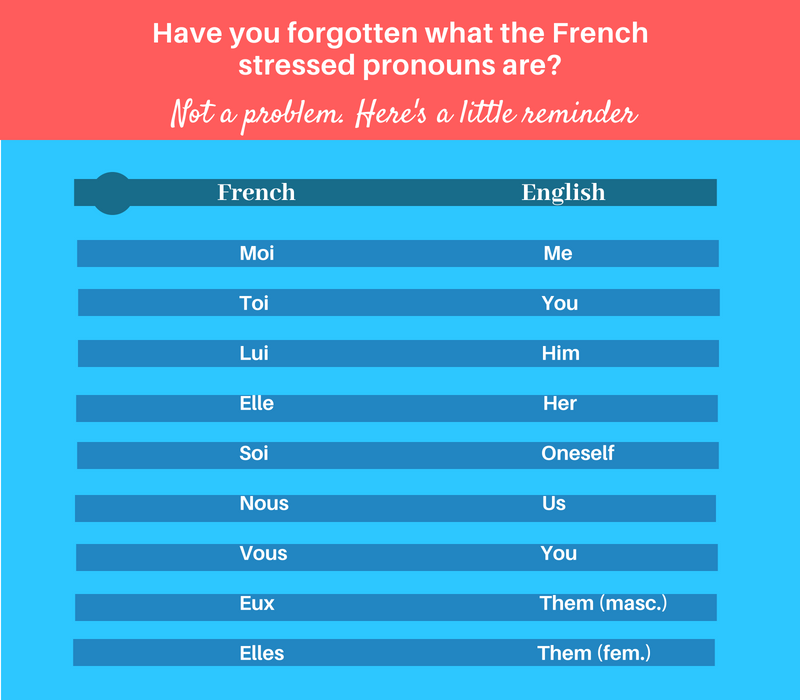
So, that’s it, you’ve got it all. A full lesson to be unbeatable when it comes to the imperative mood!
Well, let’s not get ahead of ourselves, eh! Let’s see if you have understood everything perfectly well. Have a look at the exercises below, give it your best shot and then (and only then) check your answers! Good luck!
1) Put the following sentences in the present of the imperative.
Then translate your sentences.
For example,
Il ne faut pas courir autour de la piscine → (Vous) → Ne courez pas autour de la piscine → Don’t run around the swimming pool.
Now, it’s your turn!
a) Il est interdit de fumer dans les lieux publics → (Tu)
→ _____________________________________________________________________________
→ _____________________________________________________________________________
b) Nous devons réviser pour notre contrôle → (Nous)
→ _____________________________________________________________________________
→ _____________________________________________________________________________
c) Il faut prévenir si vous êtes absents → (Vous)
→ _____________________________________________________________________________
→ _____________________________________________________________________________
d) Il ne faut pas crier dans les couloirs → (Tu)
→ _____________________________________________________________________________
→ _____________________________________________________________________________
e) Il faut envoyer notre lettre avant la fin du mois → (Nous)
→ _____________________________________________________________________________
→ _____________________________________________________________________________
f) Il est obligatoire d’amener sa pièce d’identité. → (Vous)
→ _____________________________________________________________________________
→ _____________________________________________________________________________
2) Choose the correct answer.
a) Vas chercher ton frère.
Va chercher ton frère.
b) Manges ton entrée.
Mange ton entrée.
c) Soyez sages.
Soyiez sages.
d) Faisez vos devoirs.
Faites vos devoirs.
e) Aies du courage.
Aie du courage.
f) Veuilliez nous excuser
Veuillez nous excuser.
Correction
1) Put the following sentences in the present of the imperative. Then translate your sentences.
a) Il est interdit de fumer dans les lieux publics → (Tu)
→ Ne fume pas dans les lieux publics.
→ Don’t smoke in public places.
b) Nous devons réviser pour notre contrôle → (Nous)
→ Révisons pour notre contrôle.
→ Let’s revise for our test.
c) Il faut prévenir si vous êtes absents → (Vous)
→ Prévenez si vous êtes absents.
→ Let people know if you are absent.
d) Il ne faut pas crier dans les couloirs → (Tu)
→ Ne crie pas dans les couloirs.
→ Don’t scream in the corridors.
e) Il faut envoyer notre lettre avant la fin du mois → (Nous)
→ Envoyons pas notre lettre avant la fin du mois.
→ Let’s send our letter before the end of the month.
f) Il est obligatoire d’amener sa pièce d’identité. → (Vous)
→ Amenez votre pièce d’identité.
→ Bring your ID.
2) Choose the correct answer.
a) Vas chercher ton frère.
Va chercher ton frère.
b) Manges ton entrée.
Mange ton entrée.
c) Soyez sages.
Soyiez sages.
d) Faisez vos devoirs.
Faites vos devoirs.
e) Aies du courage.
Aie du courage.
f) Veuilliez nous excuser
Veuillez nous excuser.
Conclusion
Please do share your story in the comment section on your experience with grammar.
Side Note: Want a light introduction to French Courses Online? Check Out Our French Courses Online for grammar






